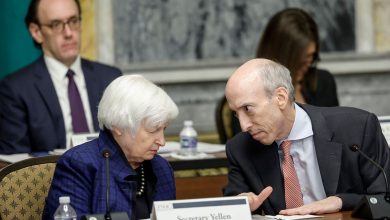Can you save money on Mark Cuban’s Cost Plus Drugs site? And how does it work with Medicare?

[ad_1]
Bill Hearn’s medication to treat his mild chronic obstructive pulmonary disease, or COPD, would cost him $275 per month from CVS Pharmacy through his Medicare Part D prescription drug plan. But the 69-year-old retiree living in Knoxville, Tennessee, gets a generic version delivered from a new online pharmacy, instead. It costs hundreds of dollars less.
“I’d read some about Costplusdrugs.com on Twitter, so I decided to check it out,” Hearn said in an email. “Their website is very easy to use to check availability and prices, and I was surprised to find a $75 per month price for the same medication (as a generic). The price was lowered to $60.50 last year.”
Cost Plus Drugs can offer significant savings on certain prescription drugs, but there are some downsides, too — particularly for people with Medicare. Here’s what Medicare beneficiaries should know about this online pharmacy.
What is Cost Plus Drugs?
The Mark Cuban Cost Plus Drug Co., or Cost Plus Drugs, is an online pharmacy for generic medications. The company, which launched in January 2022, takes its name from investor Mark Cuban, a billionaire entrepreneur and philanthropist.
Cost Plus Drugs says it sells “more than 700 of the most commonly prescribed generic medications.” It doesn’t sell any brand-name drugs or specialty drugs.
Cost Plus Drugs is notable for offering cheap medications with transparent pricing. “Every product we sell is priced exactly the same way: our cost plus 15%, plus the pharmacy fee, if any,” the company’s website says about its pricing model.
Investor and Dallas Mavericks owner Mark Cuban.
Christian Petersen/Getty Images
Cost Plus Drugs offers this example for a 30-count supply of 400 milligrams of Imatinib, a cancer drug:
- Manufacturing cost: $31.20.
- 15% markup: $4.80 (rounded per pill).
- Pharmacy labor (the “pharmacy fee”): $3.
- Shipping: $5.
Including the shipping, that would be $44 a month.
This price offers savings of more than $9,600 versus other companies’ retail prices, the company says. That comparison is probably based on brand-name Gleevec, which can cost $10,000 or more per month at retail. Generic Imatinib is much cheaper, but it can still be well over $100 per month from major retail pharmacies with a Medicare prescription drug plan.
Also see: Federal roadblocks are keeping Medicare from covering cannabis: Here’s where things stand.
Does Cost Plus Drugs work with Medicare?
“We are cheaper than Medicare copays, so we are a great place for Medicare recipients to buy medications,” Mark Cuban wrote in a Twitter direct message.
If you want to buy those lower-cost medications from Cost Plus Drugs, your Medicare plan won’t be involved. Cost Plus Drugs doesn’t bill Medicare, whether you have a stand-alone Medicare Part D plan or a Medicare Advantage plan with prescription drug coverage. You’d have to pay for medications from Cost Plus Drugs out of your own pocket, but it may be well worth doing.
You might like: Why won’t Medicare cover the new Alzheimer’s drug?
How Cost Plus Drugs affects your Medicare Part D coverage
You don’t get any credit toward your Part D deductible when you fill a prescription through Cost Plus Drugs. You only meet the Part D deductible by paying for drugs your plan is covering, and Cost Plus Drugs doesn’t bill Medicare Part D plans.
You can still meet your Medicare Part D deductible by paying for other drugs your plan covers. For example, Cost Plus Drugs doesn’t sell brand-name drugs, so you could fill brand-name prescriptions through your Part D plan and meet the deductible that way.
If you fill most or all of your prescriptions through Cost Plus Drugs, though, you’re potentially missing out on a lot of credit toward your deductible. You still have to pay your premiums, but until you hit the deductible, your Medicare Part D plan doesn’t pay for your drugs.
The Medicare Part D penalty
If you take mostly or entirely generic drugs, it might be tempting to use Cost Plus Drugs and go without Medicare Part D coverage. However, you could face the Medicare Part D late enrollment penalty. You’ll need to have either Medicare Part D or another kind of creditable coverage (such as an employer plan) that’s at least as good as Medicare Part D to avoid being penalized.
Even if you could save money by using Cost Plus Drugs and skipping Medicare Part D, you’d face the Part D penalty if you ever sign up (or sign back up) for Medicare Part D.
Learn more: What you need to know about Medicare: a breakdown of its parts
Could Cost Plus Drugs partner with Medicare?
Cost Plus Drugs isn’t entirely opposed to working with insurance companies. As of February 2023, Cost Plus Drugs only works with one insurance plan — Capital Blue Cross — but the company’s website says “we will be adding more insurance plans in the coming months.”
Cuban described the company in a Twitter direct message as “willing and able to integrate” with government programs like Medicare, and added “but we have not had those discussions yet.”
If Medicare or Medicare Advantage companies made agreements with Cost Plus Drugs, it could seriously shake up drug pricing. “If we could sell to Medicare, we could save taxpayers tens of billions of dollars,” Cuban wrote.
A 2022 study published in the Annals of Internal Medicine estimates that Medicare could have saved about $3.3 billion in 2020 if it had bought a subset of drugs available from Cost Plus Drugs at the company’s rates. (For context, the total Medicare Part D budget for fiscal year 2020 was about $89 billion, according to the Congressional Budget Office.)
Plus: Next year’s Social Security cost of living adjustment could plunge by more than half
Is Cost Plus Drugs a good idea for Medicare beneficiaries?
Medicare beneficiaries had an average of 54 prescriptions per year as of 2018, according to data analysis by the Congressional Budget Office. In the data, one prescription equals a 30-day supply, so that’s about 4.5 prescription fills a month. Saving money on even a portion of those could be a big deal for Medicare beneficiaries.
Cost Plus Drugs could be a good option for potential savings on generic drugs, even for people who already have other Medicare prescription drug coverage.
However, there are also some Medicare-specific downsides to Cost Plus Drugs. Note these additional considerations:
- Prescriptions filled through Cost Plus Drugs don’t count toward the Medicare Part D deductible.
- Cost Plus Drugs doesn’t sell brand-name drugs (which tend to be the most expensive).
- You’d owe steep and permanent penalties for going without Medicare Part D coverage, so it’s not a good idea to drop your Part D plan, even if you can get cheaper medication from Cost Plus Drugs.
In short, if you take a drug with a generic version, it’s worth checking the price on Cost Plus Drugs to see whether you could potentially save money. But Cost Plus Drugs isn’t a replacement for Medicare Part D, so take care not to run afoul of penalties that could add up to more than you save on prescriptions.
This article was written with the support of a journalism fellowship from The Gerontological Society of America, The Journalists Network on Generations and The Silver Century Foundation.
More From NerdWallet
Alex Rosenberg writes for NerdWallet. Email: arosenberg@nerdwallet.com. Twitter: @AlexPRosenberg.
[ad_2]
Source link



